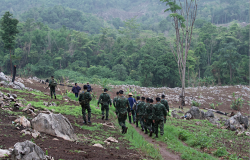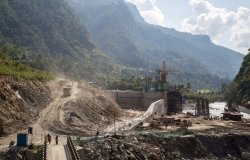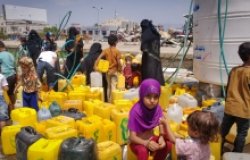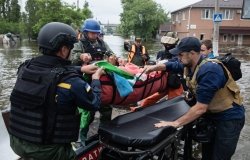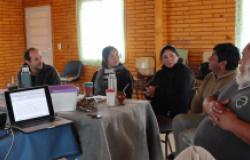International Studies Association Annual Convention Highlights Emerging Issues in Water Conflict and Cooperation
MAY 2008—ECSP Director Geoff Dabelko Chairs Panel of Leading Water Experts
Water issues featured prominently at the 49th International Studies Association (ISA) Annual Convention, which took place March 26-29, 2008, in San Francisco, California. Demonstrating the robustness of this relatively new field, several panels highlighted emerging methods for identifying the specific drivers of water conflict. Many researchers are attempting to build on the water conflict and cooperation continuum work of Aaron Wolf and his colleagues at Oregon State University (see papers by Mark Zeitoun and Naho Mirumachi), while others are delving into case studies of shared water resources (see papers by Mark T. Buntaine and Jeremy Mouat). The complete program and associated papers are available online.
Environmental Change and Security Program (ECSP) Director Geoff Dabelko chaired a roundtable entitled "Conflict and Cooperation over Shared Water Resources II" (links to audio files under "See Also"), which brought together three leading water conflict experts—Aaron Wolf of Oregon State University; Marc Levy of Columbia University's Center for International Earth Science Information Network; and Peter Gleick of the Pacific Institute—to discuss the top issues in the field of water conflict and cooperation. Ultimately, all the panelists are seeking to identify the factors that increase—or reduce—the risk of conflict in order to head off future violence.
Collaborating Across Sectors
"Poverty alleviation is explicitly a security concern," said Wolf, calling for increased attention to the links between humanitarian needs—including access to safe water—and violence. Yet the relationship between poverty, environment, and security is not fully understood, and militaries and humanitarian organizations rarely work together on issues of common concern. Wolf warned, "When you have huge areas like the North China Plain suddenly losing water resources that feed its entire agriculture sector, you basically set off a dynamic of single angry men moving to the cities that sets off a security issue."
The links between poverty and security are bound to become even more critical in the future: As the climate continues to change—with poor people bearing the brunt of the impact—it will have important implications for water supplies and for security. For instance, the Sea of Galilee reservoir, which supplies Jordan and Israel with a vital source of fresh water, faces a drier future, as the jet stream will likely shift south of the reservoir. Scarcer water could increase tensions between different users, and could shift the geopolitics of the region if certain countries gain access to more water and others are faced with diminishing supplies.
Wolf emphasized that the world views of donor countries frequently clash with those of recipient countries. Donors often fund activities like public participation processes, treaty development, and negotiations, which are rooted in Western institutions, but exclude the spiritual values that are a crucial part of the decision-making process in many non-Western countries. Wolf argued that researchers and donors need to understand the relationship between rationality and spirituality in water decision-making and its implications for water management. A Western bias can focus negotiations only on the economic value of water, ignoring its spiritual aspects and the needs of the larger community.
The Promise of Geo-Referenced Data
Levy identified three critical research questions: First, given that water stress increases the likelihood of intrastate violence, which conditions cause conflict to erupt, and which conditions reduce the likelihood of conflict? Levy believes that using geo-referenced variables such as institutional, economic, or social indicators will yield a more nuanced and comprehensive understanding of the links between water and conflict. Now that increasing amounts of geo-referenced data are available, the primary unit of analysis should shift from the nation-state to geographic areas such as water basins and agricultural zones.
Because "global change is unfolding across multiple dimensions, generating complex pressures on fragile environments that are without precedent," Levy believes researchers must examine how global environmental change will affect conflict patterns. They could use data from current development projects, as well as historical data, to assess the likelihood of conflict and help predict future impacts under similar conditions. For instance, a historical assessment could compare the responses of communities with drought insurance programs to those without such programs.
Levy plans to analyze historical datasets of natural disasters, political violence, economic shocks, and institutional changes to assess the impact of different factors on economic growth. Although it is generally assumed that these events negatively impact economic growth, no one has studied the relationship closely enough to know for certain, or to gauge the extent of the impact. Levy also suggested that the drivers of economic growth can be studied using data from current development programs; for instance, aid programs in peaceful countries can be compared with those in post-conflict areas, and programs that address natural resources can be compared with those that do not.
Toward Greater Analytical Sophistication
Gleick observed that the field of water conflict and cooperation has matured significantly over the past 15-20 years. Not so long ago, the basic definition of "security" was subject to debate, but today, there is broad consensus that water stress is indeed connected to conflict, especially at the subnational level. The Pacific Institute's Water Conflict Chronology shows that since 2000, most instances of water conflict occurred at the subnational level, and that "the vast majority are not ‘I want your water' attacks on your systems by state actors from a military point of view, but they are development disputes. They're related to poverty and economics and concerns about allocations of water legally and politically." The most recent additions to the Water Conflict Chronology support the notion that water conflicts are often caused by local-level water allocation disputes. As Gleick observed, "Maybe the most effective tool for reducing the risk of conflict is to meet basic human needs for water for everyone."
Gleick recommended that the set of tools used to reduce the risk of water-related conflict be expanded from the current set of treaties, negotiations, and conventions to include institutional, economical, technological, and legal tools. In addition, water negotiations should include representatives from NGOs, community-based organizations, government, and the private sector, as well as traditional community leaders.
Proposals for the next ISA conference, to be held February 15-18, 2009, in New York, NY, are due May 30, 2008.
To download the papers listed below, please search the online paper archive.
Conflict and Cooperation over Shared Water Resources I
- "A Tale of Two Liquids: Water, Oil, and Conflict in the Middle East and North Africa" by Miriam R. Lowy
- "Management of Internationally Shared Rivers – Peaceful Settlement Attempts in International Rivers" by Marit Brochmann and Paul R. Hensel
- "Power, Conflict and Cooperation Co-exist: International Hydro-Hegemony" by Mark Zeitoun
- "Spiritual Transformation and Lessons for Environmental Negotiations or Conflict, Cooperation, and Kabbalah" by Aaron T. Wolf
- "Water Cooperation under Conditions of Power Asymmetry: Lessons from the Euphrates and Tigris Basins" by Marwa Daoudy
- "Who's Your Neighbor? Insights From International Water Pollution" by Thomas Bernauer
International Rivers and International Relations
- "International River Law: An Oxymoron in International Environmental Politics?" by Tun Myint
- "Regional Integration, Issue Fragmentation, and Cooperative Environmental Governance in the Lancang-Mekong River Basin" by Mark T. Buntaine
- "The Provincial, National and Continental Reach of the Columbia River: Re-Examining the Columbia River Treaty of 1961/1964" by Jeremy Mouat
Related Program

Environmental Change and Security Program
The Environmental Change and Security Program (ECSP) explores the connections between environmental change, health, and population dynamics and their links to conflict, human insecurity, and foreign policy. Read more
